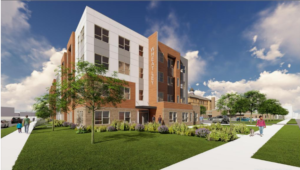
Affordable housing development efforts in Milwaukee need more money, according to a Wisconsin Policy Forum report released this week amid an ongoing push to meet that need.
The Policy Forum surveyed 47 nonprofit organizations and 14 developers involved in building, managing, financing and advocating for Milwaukee-area housing. Their combined efforts, for example, led to creation of 1,270 new affordable housing units in the city in 2019.
According to the survey, 54% of those organizations said new development was most in need of more financing, compared with other programs such as rent assistance, supportive housing and home repair. That survey result reinforces what developers in that arena have been saying for years: the demand for affordable housing in Milwaukee far exceeds their ability to finance and build it.
The Greater Milwaukee Foundation and Northwestern Mutual Foundation commissioned and financed the Wisconsin Policy Forum report, and Bader Philanthropies provided a grant for it.
The report was released a day after Milwaukee aldermen authorized an unprecedented $7.1 million in spending this year for new housing efforts. Separately, the city is working with local organizations, some of which financed the Wisconsin Policy Forum report, on a new affordable housing strategy that will identify action items for future years, said Maria Prioletta, redevelopment and special projects manager for the Milwaukee Department of City Development.
“There’s a lot of housing energy and efforts that are coalescing right now,” said Prioletta, who has been involved in city housing programs for 30 years.
The $7.1 million for housing was raised through an existing tax incremental financing district that covers the Beerline neighborhood along the Milwaukee River north of downtown. Mayor Tom Barrett proposed the spending on affordable housing in his annual budget, and aldermen approved it.
That money is earmarked for multiple programs, including some that directly address some of the concerns raised by responders to the Wisconsin Policy Forum survey.
The Milwaukee Housing Trust Fund, for example, will receive $1 million this year, up significantly from the city’s past annual contributions. That fund competitively awards grants to fill budget gaps in privately led affordable housing projects.
City officials in recent years have separately authorized tax incremental financing grants to fill budget gaps in affordable housing developments. Projects receiving direct TIF grants include the $22 million conversion of the Phillis Wheatley Elementary School located at 2442 N. 20th St. Milwaukee developer Royal Capital Group announced Tuesday that the 82-unit redevelopment is moving this month, with completion set for spring 2022. A city TIF district provided a $1 million grant to that project.
The Policy Forum report said several survey responders called for programs to help emerging minority developers raise money.
Seven are currently participating in the city’s Milwaukee Employment/Renovation Initiative, or MERI, Prioletta said. That program sells foreclosed, city-owned houses for $1 and provides grants for developers to renovate them for new homeowners or renters. Developers, including the seven people of color with growing local real estate firms, were recruited to participate in summer 2020.
“These are folks that are maybe going to do five to 10 properties over two years, per team,” Prioletta said. “It’s a way to build capacity.”
About a dozen homes have been renovated or are under construction currently through MERI, with up to 30 more expected to move forward by the end of June, Prioletta said. The program aims to redevelop 100 homes over two years, which will cost about $2 million in city funding, she said.
Another $1.4 million budgeted in 2021 is to help buyers make down payments on home purchases, Prioletta said. That program will open for applications this spring.
Alternative strategies to tackle the housing issue, including co-ops and community-owned land trusts, will be eligible to share another $1.5 million, Prioletta said. That money would support initiatives such as the Milwaukee Community Land Trust, which is intended to acquire, maintain or build affordable housing. It is financed by city residents and a grant from Associated Bank.

